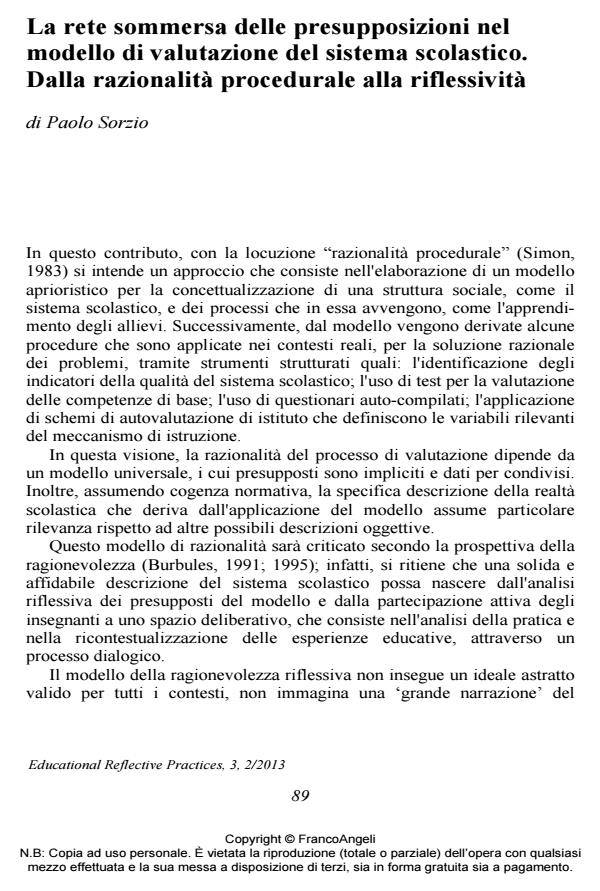La rete sommersa delle presupposizioni nel modello di valutazione del sistema scolastico. Dalla razionalità procedurale alla riflessività
Titolo Rivista EDUCATIONAL REFLECTIVE PRACTICES
Autori/Curatori Paolo Sorzio
Anno di pubblicazione 2014 Fascicolo 2013/2
Lingua Italiano Numero pagine 13 P. 89-101 Dimensione file 549 KB
DOI 10.3280/ERP2013-002006
Il DOI è il codice a barre della proprietà intellettuale: per saperne di più
clicca qui
Qui sotto puoi vedere in anteprima la prima pagina di questo articolo.
Se questo articolo ti interessa, lo puoi acquistare (e scaricare in formato pdf) seguendo le facili indicazioni per acquistare il download credit. Acquista Download Credits per scaricare questo Articolo in formato PDF

FrancoAngeli è membro della Publishers International Linking Association, Inc (PILA), associazione indipendente e non profit per facilitare (attraverso i servizi tecnologici implementati da CrossRef.org) l’accesso degli studiosi ai contenuti digitali nelle pubblicazioni professionali e scientifiche.
In this paper, the epistemology of the High-Stakes test-based accountability of schools is analysed and its consequences on practice are scrutinised. More specifically, three dimensions of the rationality incorporated in the procedural models elaborated by the National Institute for the Evaluation of the School System (Invalsi) are highlighted: the evaluation of schools through the use of students' performances on standardised tasks; the nature of the socio-economical-cultural parameters that are selected to compare the educational contexts of school provision; the proposed model to represent the learning environment of individual schools. The use of simplified parameters to describe complex socio-cultural realities and the selective focus on a limited variety of relevant evidence in the Invalsi model are examined and the risk of introducing distortions in the evaluation of the educational provision is considered. As an alternative, a perspective based on 'reflective reasonableness' (Burbules, 1991, 1995) is introduced, in order to recognise the plurality of valid descriptions of the school system, the relevance of ethnographicallygenerated evidence in understanding the quality of teaching in specific schools and the importance of valuing the voice of teachers in identifying and solving the constraints of their everyday practice
Paolo Sorzio, La rete sommersa delle presupposizioni nel modello di valutazione del sistema scolastico. Dalla razionalità procedurale alla riflessività in "EDUCATIONAL REFLECTIVE PRACTICES" 2/2013, pp 89-101, DOI: 10.3280/ERP2013-002006